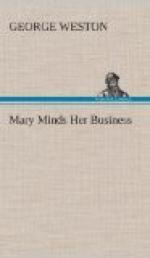“It’s a promise,” agreed Mrs. Kelly, and when she reached the hall outside and saw the size of Mary’s subscription she joyfully smote an imaginary sheepskin, “Boom.... Boom.... Boom-boom-boom...!”
That is the week that Wally was married—with a ceremony that Helen had determined should be the social event of the year.
She was busy with her plans for weeks, making frequent trips to New York and Boston in the building up of her trousseau, arranging the details of the breakfast, making preparations for the decorations at the church and at the house on the hill, preparing and revising her list of those to be invited, ordering the cake and the boxes, attending to the engraving, choosing the music, keeping in touch with the bridesmaids and their dresses.
“Why, she’s as busy as I am,” thought Mary one day, in growing surprise at Helen’s knowledge and ability; and dimly she began to see that in herself and Helen were embodied two opposite ideas of feminine activity.
“Of course she believes her way is the best,” continued Mary thoughtfully, “just the same as I believe mine is. But I can’t help thinking that it’s best to be doing something useful, something that really makes a difference in the world—so that at the end of every week we can say to ourselves, ‘Well, I did this’ or ’I did that’—’I haven’t lived this week for nothing....’”
Mary started dreaming then, and the next day when she accompanied Helen up the aisle of St. Thomas’s as maid of honour, her eyes went dreamier still. And yet if you had been there I think you might have seen the least trace of a shadow in their depths—just the least suspicion of a wavering, unguessed doubt.
But when Wally, with his wife at his side, started his car an hour later and rolled smoothly on his wedding tour in search of the great adventure, in search of the sweetest story—Mary changed her dress and hurried back to the factory where she made a tour of her own. And as she walked through the workshops with their long lines of contented women, passing up one aisle and down another—nearly every face turning for a moment and flashing her a smile—the shadows vanished from her eyes and her doubts went with them.
“This is the best,” she told herself, “I’m sure I did right, choosing this instead of Wally. It’s best for me, and best for these three thousand women—” Her imagination caught fire. She saw her three thousand pioneers growing into three hundred thousand, into three million. A moment of greatness fell upon her and in fancy she thus addressed her unsuspecting workers:
“You are doing something useful—something that you can be proud of. Your daily labour isn’t wasted. There isn’t a country in the world that won’t profit by it.
“Because of these bearings which you are making, automobiles and trucks will carry their loads more easily, tractors will plough better, engines will run longer, water will be pumped more quickly, electric light will be sold for less money.




